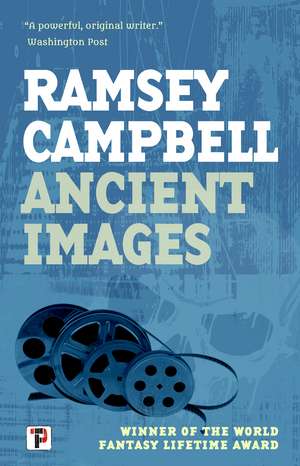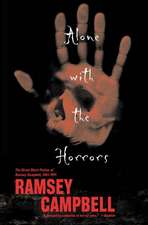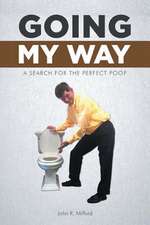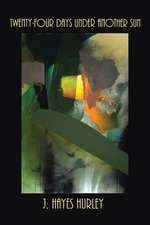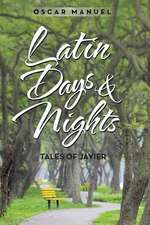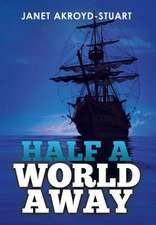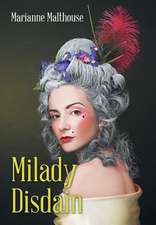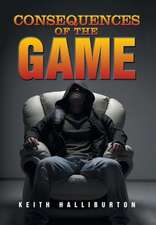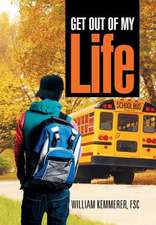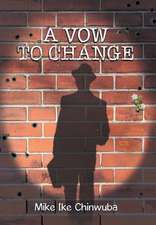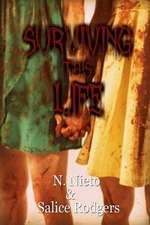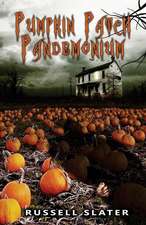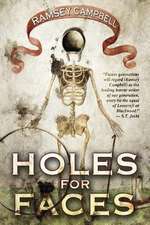Ancient Images
Autor Ramsey Campbellen Limba Engleză Paperback – 21 feb 2023
FLAME TREE PRESS is the imprint of long-standing Independent Flame Tree Publishing, dedicated to full-length original fiction in the horror and suspense, science fiction & fantasy, and crime / mystery / thriller categories. The list brings together fantastic new authors and the more established; the award winners, and exciting, original voices. Learn more about Flame Tree Press at www.flametreepress.com and connect on social media @FlameTreePress.
| Toate formatele și edițiile | Preț | Express |
|---|---|---|
| Paperback (2) | 58.94 lei 3-5 săpt. | +16.01 lei 7-13 zile |
| Flame Tree Publishing – 21 feb 2023 | 58.94 lei 3-5 săpt. | +16.01 lei 7-13 zile |
| Flame Tree Publishing – 21 feb 2023 | 89.40 lei 3-5 săpt. | |
| Hardback (1) | 116.81 lei 3-5 săpt. | +29.35 lei 7-13 zile |
| Flame Tree Publishing – 21 feb 2023 | 116.81 lei 3-5 săpt. | +29.35 lei 7-13 zile |
Preț: 58.94 lei
Preț vechi: 63.83 lei
-8% Nou
Puncte Express: 88
Preț estimativ în valută:
11.28€ • 11.73$ • 9.31£
11.28€ • 11.73$ • 9.31£
Carte disponibilă
Livrare economică 22 martie-05 aprilie
Livrare express 08-14 martie pentru 26.00 lei
Preluare comenzi: 021 569.72.76
Specificații
ISBN-13: 9781787587632
ISBN-10: 1787587630
Pagini: 304
Dimensiuni: 130 x 196 x 26 mm
Greutate: 0.27 kg
Ediția:Nouă
Editura: Flame Tree Publishing
Colecția FLAME TREE PRESS
Locul publicării:United States
ISBN-10: 1787587630
Pagini: 304
Dimensiuni: 130 x 196 x 26 mm
Greutate: 0.27 kg
Ediția:Nouă
Editura: Flame Tree Publishing
Colecția FLAME TREE PRESS
Locul publicării:United States
Descriere
The 1970s. Graham Nolan is a film researcher who specialises in tracking down lost films. His latest find is Tower of Fear, a horror film that starred Boris Karloff and Bela Lugosi. He plans to share the first showing with his colleague Sandy Allan, but he dies while fleeing a presence in his apartment, and the film is nowhere to be found. To vindicate his reputation Sandy sets out to prove the film exists, and tracks down several people who were involved in the thirties production. She learns that some who worked on the film died in odd circumstances or did their best to put the film behind them. Those she interviews are reluctant to talk about the uncanny occurrences that dogged the production. At the time the project was condemned in parliament by a British lord, Redfield of Redfield, and the newspaper his family owned condemned the film unseen.
Sandy’s search leads her to Redfield, home of a standard elements item of British diet, Staff o’ Life bread. The present lord of the manor seems cordial enough, but Sandy’s other experiences at Redfield aren’t so reassuring: a tower whose spiral stairs descend into terror, the scarecrow figures that seem too active for scarecrows, even a trio of village ladies determined to show her what she ought to see. Meanwhile Enoch’s Army, a band of new age travellers, are heading for Redfield.
Sandy locates a copy of Tower of Fear at last, but her viewing only helps to mark her with the Redfield curse. The Redfield land has always needed blood in order to stay fertile, and its denizens that once were human carry out its needs. One of them has followed her to London while Enoch’s Army, ideal sacrifices, set up camp at Redfield. Even if Sandy deduces the truth, it may be too late to save everyone…
Sandy’s search leads her to Redfield, home of a standard elements item of British diet, Staff o’ Life bread. The present lord of the manor seems cordial enough, but Sandy’s other experiences at Redfield aren’t so reassuring: a tower whose spiral stairs descend into terror, the scarecrow figures that seem too active for scarecrows, even a trio of village ladies determined to show her what she ought to see. Meanwhile Enoch’s Army, a band of new age travellers, are heading for Redfield.
Sandy locates a copy of Tower of Fear at last, but her viewing only helps to mark her with the Redfield curse. The Redfield land has always needed blood in order to stay fertile, and its denizens that once were human carry out its needs. One of them has followed her to London while Enoch’s Army, ideal sacrifices, set up camp at Redfield. Even if Sandy deduces the truth, it may be too late to save everyone…
Notă biografică
Ramsey Campbell was born in Liverpool in 1946 and now lives in Wallasey. He has received the Grand Master Award of the World Horror Convention, the Lifetime Achievement Award of the Horror Writers Association, the Living Legend Award of the International Horror Guild and the World Fantasy Lifetime Achievement Award. In 2015 he was made an Honorary Fellow of Liverpool John Moores University for outstanding services to literature.
His first book was published by the legendary Arkham House when he was eighteen years old. His later work draws on the British and American traditions of horror fiction. It ranges from the psychological to the ghostly, the subtly uncanny to the cosmic, the quietly disquieting to the terrifying, the poignant to the darkly comic. His Flame Tree books include Thirteen Days by Sunset Beach, in which a family on holiday encounters an ancient horror on a Greek island, and Think Yourself Lucky, where the internet lets loose the monsters lurking within people just like us. In Somebody’s Voice a writer finds his memory and personality threatened by trying to write the memoir of a victim of abuse. The Three Births of Daoloth trilogy – The Searching Dead, Born to the Dark and The Way of the Worm – pits three childhood friends against a terror as vast as time and space.
Three of Campbell’s novels have been filmed – The Influence (available from FLAME TREE PRESS), Pact of the Fathers and The Nameless (in development as a Netflix series). He reviewed films for the local BBC for nearly forty years, and is presently working on an appreciation of the Three Stooges, Six Stooges and Counting. A new supernatural novel, Fellstones, is in progress too.
His first book was published by the legendary Arkham House when he was eighteen years old. His later work draws on the British and American traditions of horror fiction. It ranges from the psychological to the ghostly, the subtly uncanny to the cosmic, the quietly disquieting to the terrifying, the poignant to the darkly comic. His Flame Tree books include Thirteen Days by Sunset Beach, in which a family on holiday encounters an ancient horror on a Greek island, and Think Yourself Lucky, where the internet lets loose the monsters lurking within people just like us. In Somebody’s Voice a writer finds his memory and personality threatened by trying to write the memoir of a victim of abuse. The Three Births of Daoloth trilogy – The Searching Dead, Born to the Dark and The Way of the Worm – pits three childhood friends against a terror as vast as time and space.
Three of Campbell’s novels have been filmed – The Influence (available from FLAME TREE PRESS), Pact of the Fathers and The Nameless (in development as a Netflix series). He reviewed films for the local BBC for nearly forty years, and is presently working on an appreciation of the Three Stooges, Six Stooges and Counting. A new supernatural novel, Fellstones, is in progress too.
Recenzii
"There are a few writers who are special. They make the world in their books; or rather, they open a window or a door or a magic casement, and they show you the world in which they live. Ramsey Campbell, for example, writes stories that, read in quantity, will re-form your world into a grey and ominous place in which strange shapes flicker at the corner of your eyes, and a patch of smoke or a blown plastic shopping bag takes on some kind of ghastly significance."
"An exemplar of Campbell’s work, as well as a sophisticated exercise in quiet horror flavoured with cinephilia."
Concatenation
Praise for Ramsey Campbell:
“An absolute master of modern horror. And a damn fine writer at that” (Guillermo del Toro)
“He is unsurpassed in the subtle manipulation of mood... You forget you’re just reading a story” (Publishers Weekly)
“He writes of our deepest fears in a precise, clear prose that somehow manages to be beautiful and terrifying at the same time. He is a powerful, original writer, and you owe it to yourself to make his acquaintance” (Washington Post)
“Britain’s most respected living horror writer” (Oxford Companion to English Literature)
“Easily the best horror writer working in Britain today” (Time Out)
“Britain’s leading horror writer... His novels have been getting better and better” (City Limits)
“One of Britain’s most accomplished horror writers” (Oxford Star)
“The John Le Carre of horror fiction” (Bookshelf, Radio 4) “
One of the best real horror writers at work today” (Interzone)
“The greatest living exponent of the British weird fiction tradition” (The Penguin Encyclopaedia of Horror and the Supernatural)
“Ramsey Campbell has succeeded more brilliantly than any other writer in bringing the supernatural tale up to date without sacrificing the literary standards that early masters made an indelible part of the tradition” (Jack Sullivan, editor of the Penguin encyclopaedia)
“England’s contemporary king of the horror genre” (Atlanta Constitution)
“One of the few real writers in our field... In some ways Ramsey Campbell is the best of us all” (Peter Straub)
“Ramsey Campbell has a talent for terror – he knows how to give you nightmares while you’re still awake... Only a few writers can lay claim to such a level of consummate craftsmanship” (Robert Bloch)
“Campbell writes the most terrifying horror tales of anyone now alive” (Twilight Zone Magazine)
“One of the world’s finest exponents of the classic British ghost story” (Sounds)
“Britain’s greatest living horror writer” (Alan Moore)
“For sheer ability to compose disturbing, evocative prose, he is unmatched in the horror/fantasy field... He turns the traditional horror novel inside out, and makes it work brilliantly” (Fangoria)
“Campbell has solidly established himself to be the best writer working in this field today” (Karl Edward Wagner, The Year’s Best Horror Stories)
“When Mr Campbell pits his fallible, most human characters against enormous forces bent on incomprehensible errands the results are, as you might expect, often frightening, and, as you might not expect, often touching; even heartwarming” (Gahan Wilson in The Magazine of Fantasy and Science Fiction)
“Britain’s leading horror novelist” (New Statesman)
“Ramsey Campbell is Britain’s finest living writer of horror stories: considerable praise for a man whose country boasts the talents of Clive Barker and Roald Dahl, M. John Harrison and Nigel Kneale” (Douglas Winter, editor of Prime Evil)
“Campbell writes the most disturbing horror fiction around” (Today)
“Ramsey Campbell is better than all the rest of us put together” (Dennis Etchison)
“Ramsey Campbell is the best horror writer alive, period” (Thomas Tessier)
“A horror writer in the classic mould... Britain’s premier contemporary exponent of the art of scaring you out of your skin” (Q Magazine)
“The undisputed master of the psychological horror novel” (Robert Holdstock)
“Perhaps the most important living writer in the horror fiction field” (David Hartwell)
“Ramsey Campbell’s work is tremendous” (Jonathan Ross)
“Campbell is a rightful tenant of M. R. James country, the genuine badlands of the human psyche” (Norman Shrapnel in the Guardian)
“One of the world’s finest exponents of the classic British ghost story... His writing explores the potential for fear in the mundane, the barely heard footsteps, the shadow flitting past at the edge of one’s sight” (Daily Telegraph)
“The Grand Master of British horror... the greatest living writer of horror fiction” (Vector)
“Britain’s greatest horror writer... Realistic, subtle and arcane” (Waterstone’s Guide to Books)
“In Campbell’s hands words take on a life of their own, creating images that stay with you, feelings that prey on you, and people you hope never ever to meet” (Starburst)
“The finest writer now working in the horror field” (Interzone)
“Ramsey Campbell is the nearest thing we have to an heir to M. R. James” (Times)
“Campbell is literate in a field which has attracted too many comic-book intellects, cool in a field where too many writers – myself included – tend toward panting melodrama... Good horror writers are quite rare, and Campbell is better than just good” (Stephen King)
“Easily the finest practising British horror novelist and the one whose work can most wholeheartedly be recommended to those who dislike the genre... His misclassification as a genre writer obscures his status as the finest magic realist Britain possesses this side of J. G. Ballard” (Daily Telegraph)
“Good stuff. But strange; so uniquely Campbell that it might as well be trademarked” (Stephen King)
“One of the few who can scare and disturb as well as make me laugh out loud. His humour is very black but very funny, and that’s a rare gift to have” (Mark Morris in the Observer)
“The most sophisticated and highly regarded of British horror writers” (Financial Times)
“I would say that only five writers have written serious novels which incorporate themes of fantasy or the inexplicable and still qualify as literature: T. E. D. Klein, Peter Straub, Richard Adams, Jonathan Carroll and Ramsey Campbell” (Stephen King)
“Ramsey Campbell is the best of us all” (Poppy Z. Brite)
“The foremost stylist and innovator in British horror fiction” (The Scream Factory)
“One of the century’s great literary exponents of the gothic and horrific” (Guardian)
“Ramsey Campbell is one of the modern masters of horror… He has a genius for infusing horror into the everyday, piling up small moments of dread and confusion and fear until they become insurmountable.” (Tim Pratt in Locus)
“One of the all-time greats of British horror fiction” (Damien Walter in the Guardian)
“There are a few writers who are special. They make the world in their books; or rather, they open a window or a door or a magic casement, and they show you the world in which they live. Ramsey Campbell, for example, writes stories that, read in quantity, will re-form your world into a grey and ominous place in which strange shapes flicker at the corner of your eyes, and a patch of smoke or a blown plastic shopping bag takes on some kind of ghastly significance.” (Neil Gaiman)
"An exemplar of Campbell’s work, as well as a sophisticated exercise in quiet horror flavoured with cinephilia."
Concatenation
Praise for Ramsey Campbell:
“An absolute master of modern horror. And a damn fine writer at that” (Guillermo del Toro)
“He is unsurpassed in the subtle manipulation of mood... You forget you’re just reading a story” (Publishers Weekly)
“He writes of our deepest fears in a precise, clear prose that somehow manages to be beautiful and terrifying at the same time. He is a powerful, original writer, and you owe it to yourself to make his acquaintance” (Washington Post)
“Britain’s most respected living horror writer” (Oxford Companion to English Literature)
“Easily the best horror writer working in Britain today” (Time Out)
“Britain’s leading horror writer... His novels have been getting better and better” (City Limits)
“One of Britain’s most accomplished horror writers” (Oxford Star)
“The John Le Carre of horror fiction” (Bookshelf, Radio 4) “
One of the best real horror writers at work today” (Interzone)
“The greatest living exponent of the British weird fiction tradition” (The Penguin Encyclopaedia of Horror and the Supernatural)
“Ramsey Campbell has succeeded more brilliantly than any other writer in bringing the supernatural tale up to date without sacrificing the literary standards that early masters made an indelible part of the tradition” (Jack Sullivan, editor of the Penguin encyclopaedia)
“England’s contemporary king of the horror genre” (Atlanta Constitution)
“One of the few real writers in our field... In some ways Ramsey Campbell is the best of us all” (Peter Straub)
“Ramsey Campbell has a talent for terror – he knows how to give you nightmares while you’re still awake... Only a few writers can lay claim to such a level of consummate craftsmanship” (Robert Bloch)
“Campbell writes the most terrifying horror tales of anyone now alive” (Twilight Zone Magazine)
“One of the world’s finest exponents of the classic British ghost story” (Sounds)
“Britain’s greatest living horror writer” (Alan Moore)
“For sheer ability to compose disturbing, evocative prose, he is unmatched in the horror/fantasy field... He turns the traditional horror novel inside out, and makes it work brilliantly” (Fangoria)
“Campbell has solidly established himself to be the best writer working in this field today” (Karl Edward Wagner, The Year’s Best Horror Stories)
“When Mr Campbell pits his fallible, most human characters against enormous forces bent on incomprehensible errands the results are, as you might expect, often frightening, and, as you might not expect, often touching; even heartwarming” (Gahan Wilson in The Magazine of Fantasy and Science Fiction)
“Britain’s leading horror novelist” (New Statesman)
“Ramsey Campbell is Britain’s finest living writer of horror stories: considerable praise for a man whose country boasts the talents of Clive Barker and Roald Dahl, M. John Harrison and Nigel Kneale” (Douglas Winter, editor of Prime Evil)
“Campbell writes the most disturbing horror fiction around” (Today)
“Ramsey Campbell is better than all the rest of us put together” (Dennis Etchison)
“Ramsey Campbell is the best horror writer alive, period” (Thomas Tessier)
“A horror writer in the classic mould... Britain’s premier contemporary exponent of the art of scaring you out of your skin” (Q Magazine)
“The undisputed master of the psychological horror novel” (Robert Holdstock)
“Perhaps the most important living writer in the horror fiction field” (David Hartwell)
“Ramsey Campbell’s work is tremendous” (Jonathan Ross)
“Campbell is a rightful tenant of M. R. James country, the genuine badlands of the human psyche” (Norman Shrapnel in the Guardian)
“One of the world’s finest exponents of the classic British ghost story... His writing explores the potential for fear in the mundane, the barely heard footsteps, the shadow flitting past at the edge of one’s sight” (Daily Telegraph)
“The Grand Master of British horror... the greatest living writer of horror fiction” (Vector)
“Britain’s greatest horror writer... Realistic, subtle and arcane” (Waterstone’s Guide to Books)
“In Campbell’s hands words take on a life of their own, creating images that stay with you, feelings that prey on you, and people you hope never ever to meet” (Starburst)
“The finest writer now working in the horror field” (Interzone)
“Ramsey Campbell is the nearest thing we have to an heir to M. R. James” (Times)
“Campbell is literate in a field which has attracted too many comic-book intellects, cool in a field where too many writers – myself included – tend toward panting melodrama... Good horror writers are quite rare, and Campbell is better than just good” (Stephen King)
“Easily the finest practising British horror novelist and the one whose work can most wholeheartedly be recommended to those who dislike the genre... His misclassification as a genre writer obscures his status as the finest magic realist Britain possesses this side of J. G. Ballard” (Daily Telegraph)
“Good stuff. But strange; so uniquely Campbell that it might as well be trademarked” (Stephen King)
“One of the few who can scare and disturb as well as make me laugh out loud. His humour is very black but very funny, and that’s a rare gift to have” (Mark Morris in the Observer)
“The most sophisticated and highly regarded of British horror writers” (Financial Times)
“I would say that only five writers have written serious novels which incorporate themes of fantasy or the inexplicable and still qualify as literature: T. E. D. Klein, Peter Straub, Richard Adams, Jonathan Carroll and Ramsey Campbell” (Stephen King)
“Ramsey Campbell is the best of us all” (Poppy Z. Brite)
“The foremost stylist and innovator in British horror fiction” (The Scream Factory)
“One of the century’s great literary exponents of the gothic and horrific” (Guardian)
“Ramsey Campbell is one of the modern masters of horror… He has a genius for infusing horror into the everyday, piling up small moments of dread and confusion and fear until they become insurmountable.” (Tim Pratt in Locus)
“One of the all-time greats of British horror fiction” (Damien Walter in the Guardian)
“There are a few writers who are special. They make the world in their books; or rather, they open a window or a door or a magic casement, and they show you the world in which they live. Ramsey Campbell, for example, writes stories that, read in quantity, will re-form your world into a grey and ominous place in which strange shapes flicker at the corner of your eyes, and a patch of smoke or a blown plastic shopping bag takes on some kind of ghastly significance.” (Neil Gaiman)
